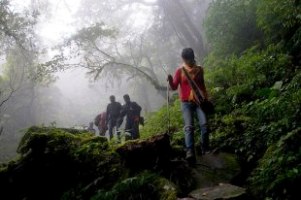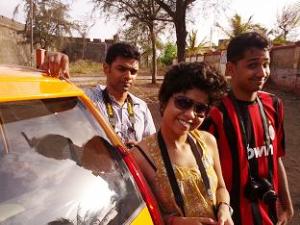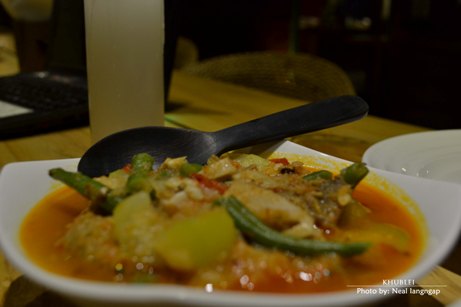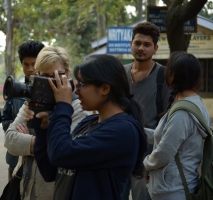I was in Handitola village in Rajnandgaon district of Chhattisgarh state in central India. With me was a local woman social activist. We arrived at the house of the village council head (locally known as 'sarpanch'). As it turned out, she was away from home, and would return in another half an hour. Her son and daughter-in-law were at home and they requested us to sit. They also offered to make tea for us.
We were waiting. The house had a neat courtyard, three rooms, a nice little veranda and a cowshed. I walked around a bit, peeped here, peeped there. I could see no toilet.
We had eaten a rather large breakfast in the morning at Bhan Didi’s (the activist) place because it was going to be a long day, and I also drank a large glass of chai. Now, I was feeling the pressure on my bladder. I needed to go, urinate. But, there was no place to go.
I came out of the house and looked around. The house of the sarpanch was on the main road that went cutting through the village. There were people moving up and down the road every few seconds. There were also houses on both sides of the road. There were no walls, or even a hedge separating them. And there were no trees. The only greenery that came was from a few vegetable creepers which went straight on the roof of each house. So, no 'bush' as such!
On the other side of the road, there was a community cultural hall. This was, as the sarpanch would later tell us, the prized possession of the village. She had spent over a hundred thousand rupees to build it. I walked up to the community hall, thinking, 'there ought to be a toilet here.' The hall was big. It had a large podium, several benches and several chairs. There were earthen pot of drinking water and a steel tumbler in a corner. No toilet.
I heard a call. The sarpanch had returned home. Her daughter in-law had made chai and was calling me now. I started to panic: refusing the drink would be seen as a rude gesture, almost an insult; it would be interpreted as me telling them 'I am superior to you, so I won't eat or drink with you'.
And that would end any chances of a candid conversation with the sarpanch. It wasn't a risk I would ever take.
But drinking a large cup of chai, thickened with sugar and milk - was going to increase that pressure on my bladder for sure. What should I do?
I must have looked very helpless, because Bhan didi looked at me and said, 'come inside and sit. Let us finish the work quickly and then go. If you stand, the pressure (on the bladder) will be greater.'
I paid heed. I returned to the sarpanch's house. I sat with one thigh on another, to suppress the pressure on my bladder.
Over the chai, our conversation began. Most of it centered on sanitation, especially open urination and open defecation. You can read her answers ('Open defecation continues because we have no water') in this story of mine.
At one point, I remember getting up and opening the top button of my jeans because I felt a swell in my abdomen and the waist band of the jeans was cutting into it.
Our conversation, as it always happens with me, didn't end for another couple of hours. And then the sarpanch wanted to give me a tour of the village, especially the facilities she had built. These included her office, a play school cum health center for village children and a hostel for girl students. The latter had a toilet.
My heart jumped. I wanted to see the toilet. The sarpanch went into her office and brought a key. The toilet had a big lock. Why lock a toilet?
"There is no water. So, we let the girls use it only when there is an emergency like someone has loose motion or something. If we keep it open, girls would go in anyway and try using it all the time. It would then stink and become a nuisance,' she said.
'But how do you manage water in an emergency?' I wanted to know.
'The girls carry a pitcher from the community pond (nearly a km away) and pour it here,' she replied, showing a iron bucket which was completely dry. After this, she quickly locked the toilet door again.
I was hoping that if she showed me a toilet, I would request her to let me use it. Now that hope vanished.
It was afternoon when we finished the work. We could now go home. My thighs were numb by now. I walked slowly, like one with a hunchback
The village was connected by bus and we started to walk towards the bus stop. On our way, we saw the community pond - a large pond, now half dry, with a few short date-palm trees standing in each corner, like a group of midgets.
The sarpanch was walking with us. Pointing at a corner, she asked me 'that is where we go (to relieve ourselves), would you like to go too?'
I looked around. It was about a hundred yards away from the main road (on which buses, motorbikes and bullock carts ran), and today the village was celebrating "Mandai "- a village carnival, so the road was dotted with people.
I nodded. Yes, I had to go. I had not urinated for a good 10 hours now and could hold it no longer.
The sarpanch and the social activist stood guard near a palm tree. And I went behind one, pulled down my jeans.
I didn't care if the tree was big enough to cover all of me. I didn't care that the urine actually rolled down and went into a field where locals would sow rice and other grains. I didn't care that the ground under the date tree was filthy, layered with feces and gave a nauseating smell. I didn't care because I couldn't.
All I cared about was that I had to go and that I was being guarded by someone who would stop an intruder.
But when I began, I again felt a panic. What if someone actually came up to see what was happening? In my panic, I tried to empty my bowel faster, putting more pressure on my bladder. I couldn't. I was helpless. I had to squat until I was done. And I was very aware of my naked bottom.
Once I was done, I remember coming out, feeling dirty (the sole of my shoes were wet from the urine) and embarrassed (I wasn't so sure nobody had even looked up at me from the road or someplace else around the pond). And I felt a deep sense of shame for which I couldn’t find an explicable reason.
Later that evening when we sat in the bus, I thought of the girls and women who suppressed their pressure for 10 hours or more every day and then went behind a tree like I did, because they simply had to go.
And then I thought of them who had nobody guarding them. I thought how would also panic while emptying their bowel. How they would feel ashamed and afraid if they heard an approaching footstep. I couldn't think any further, I shuddered and closed my eyes. The bodies of the Badaun sisters kept hanging in front of my closed eyes.







































